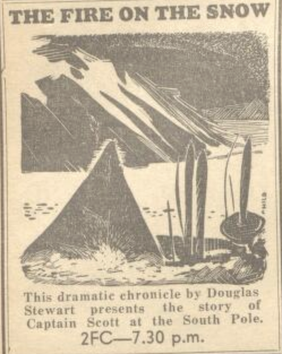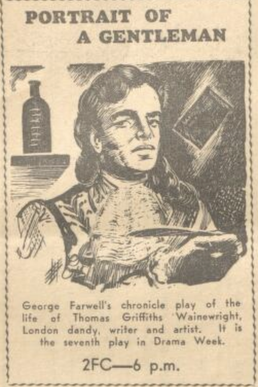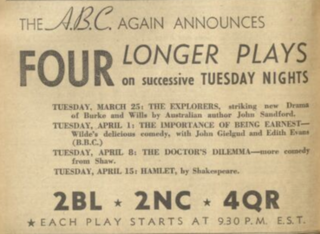
The Fire on the Snow is a 1941 Australian verse play by Douglas Stewart about the Terra Nova Expedition to Antarctica by Robert Falcon Scott. It premiered on ABC radio on 6 June 1941 to great acclaim and inspired a series of Australian verse dramas on ABC radio.
Interval is a 1939 play by Sumner Locke Elliott. It was popular and was performed throughout Australia at a time when this was not common for local plays.
The Cow Jumped Over the Moon is a 1937 Australian stage play by Sumner Locke Elliott. It was the first stage play by Elliott who was only twenty years old when it debuted.
The Little Sheep Run Fast is a 1940 Australian play by Sumner Locke Elliott. Being a drama, it was a change of pace from his first two stage plays which were both comedies.
Margaret Catchpole is a 1945 Australian radio drama by Rex Rienits about Margaret Catchpole. It was one of several dramatisations of Australian historical figures by Rienits.
The Playwrights' Advisory Board was an Australian organisation established in 1938 to assist the cause of Australian playwriting. It was established by Leslie Rees, Rex Rienits and Doris Fitton. Its functions included negotiating productions with theatres, acting as an intermediary in the nomination and collection of royalties, advising theatres and playwrights on scripts, and holding script competitions. Members of the board included names such as Dymphna Cusack and Sumner Locke Elliott.
Wives Have Their Uses is a 1938 Australian stage play by Gwen Meredith. It is a comedy.
Daybreak is a 1938 Australian play by Catherine Shepherd.
Sons of the Morning is a 1945 verse drama Australian play by Catherine Duncan. It was originally written for radio.

Portrait of a Gentleman is a 1940 Australian radio play by George Farwell about Thomas Griffiths Wainewright. It was the first time Wainewright's life had been dramatised.

The Remittance Man is a 1939 Australian radio play by Richard Lane. It was one of the most acclaimed Australian radio plays of the 1930s.
Maurice Francis was an Australian radio writer. He was one of the most prolific writers of radio dramas in the 1930s until the 1950s and was noted for his association with George Edwards.

The Explorers is a 1952 Australian radio play about the Burke and Wills expedition by John Sandford. It was Sandford's first play.
Merry-Go-Round is a 1936 Australian radio play by Max Afford. It won first prize in the ABC Radio Contest for best play.

"We Were Children" is a 1952 American television play by Sumner Locke Elliott. It originally aired as an episode of The Philco Television Playhouse produced by Fred Coe.
The First Gentleman is a 1945 Australian radio play by Betty Roland about Benjamin Boyd. It was one of Roland's most notable works.
The Path of the Eagle is a 1943 Australian radio play by Catherine Duncan. It was originally written under the title Succubus. The play was a telling of the Oedipus story.

Scarlet Rhapsody is a 1947 Australian radio serial by Sumner Locke Elliott for the George Edwards Players.
Girl of the Ballet is a 1942 Australian radio serial by Sumner Locke Elliott for the George Edwards Company. It was the story of "an insignificant milliner who became the rage of Europe and America. Scandal nearly wrecked her career, she had a tragic marriage, and ended her days clinging desperately to the tarnished trappings of her vanished glory.
The Drovers is a 1921 Australian play by Louis Esson. According to Esson's obituary the play was his "finest piece... one scene, one simple incident; it was what he could do; be never did anything better; and no one else did, either."






